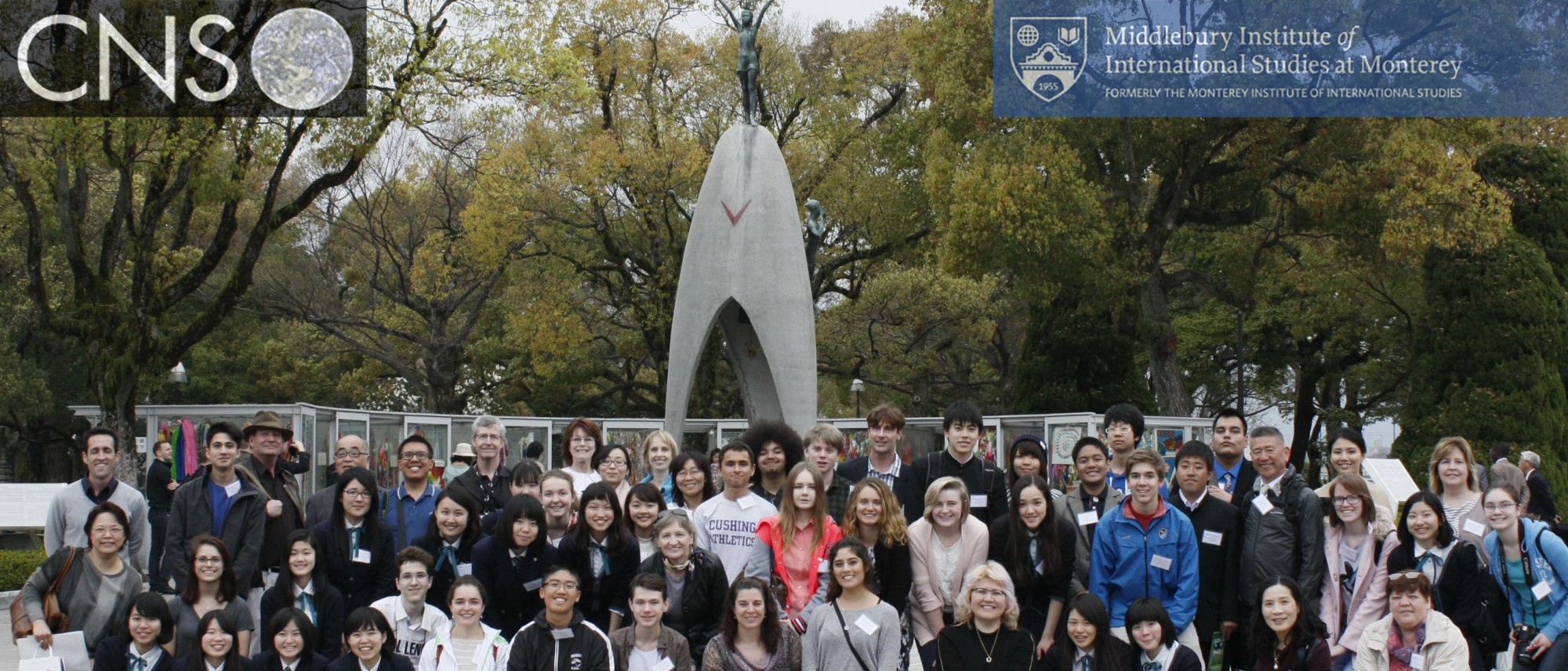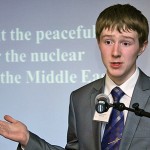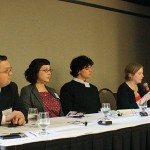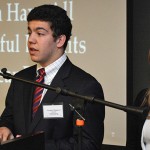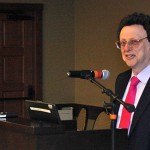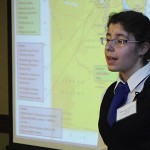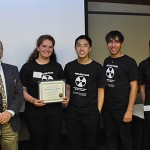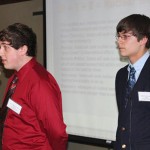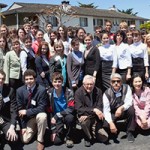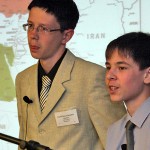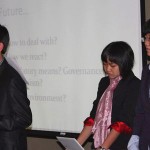American, Chinese, and Russian
High School Students Discuss Solutions
to Nuclear Challenges in the Middle East
View the 2011 Conference Photos
The recent political upheaval in the Middle East and the March 2011 nuclear accident at the Fukushima Daiichi plant in Japan have brought issues of nuclear safety, security, and proliferation to the top of the global agenda. For more than a decade, the James Martin Center for Nonproliferation Studies (CNS), with support from the Ford Foundation and the U.S. Department of Energy, has encouraged high school students to explore these vital issues through its Critical Issues Forum program (CIF). This program aims to increase the awareness of nonproliferation and disarmament issues and enhance critical thinking skills in these students. The culmination of the 2010-2011 CIF program occurred on April 28 and 29, as students and teachers from China, Russia and around the United States gathered in Monterey to present the results of their research on nuclear energy and nuclear weapons in the Middle East. Sixty students and 27 teachers from 8 U.S. high schools, 10 schools in Russia’s closed nuclear cities attended along with students from Tsinghua High School in Beijing, marking the first time in the project’s history that a school from China has participated in the conference.
The 2010-2011 CIF program was kicked off in November 2010 with a curriculum development workshop for teachers where this year’s topic was introduced. The participating teachers followed the curriculum on nuclear energy and nuclear weapons in the Middle East with their own students. Throughout the semester, participating students, under the instruction of each school’s CIF teacher, undertook comprehensive coursework including topics such as nuclear technology, history of the Middle East, and proliferation concern in the region. Students also researched relevant multilateral nonproliferation and arms control regimes. The CIF program had students examine possible ways to prevent the spread of nuclear weapons in the region, including establishment of a Middle East nuclear weapon free zone (NWFZ), strengthening International Atomic Energy Agency (IAEA) safeguards, enforcing sanctions, and military action.
CIF Participants Look for Solutions
The presentations at the conference approached complex regional issues from a variety of perspectives. First time participants from Tsinghua High School presented their views on nuclear proliferation in the Middle East in a very innovative way. Tsinghua students used Iran and Israel as case studies and incorporated cultural and economic factors to formulate their recommendations. They also used an analogy between scientific aspects of nuclear weapons and political dimensions of nuclear development of countries in the region. Maine’s Presque Isle High School marked its second year of participation in the program with a thoughtful examination of possible solutions to concerns about nuclear proliferation in the Middle East. One of the veteran participants, Franklin High School from Elk Grove, California, reviewed issues surrounding nuclear development and conflicts in the Middle East using several medium from both historical and contemporary perspectives. Elk Grove’s presentation dramatically incorporated poetry, video, music, and soliloquy; the students gave a solid overview of nuclear program development in the region—including scientific, political, and historical aspects—while at the same time providing a creative and artistically entertaining presentation.
The timing of the conference marked the 25th anniversary of the Chernobyl nuclear power plant accident. Therefore, participating students, particularly, Russian students incorporated the issue of nuclear safety to prevent future occurrence of such accidents. School No. 125 from Snezhinsk, Russia, focused their analysis on global concerns about nuclear activities in the Middle East given the possibility of an upsurge in civilian nuclear development in the region. The school presented on the civilian nuclear programs and plans of major countries in the region based on their comprehensive review of issues from technical, historical and economic perspectives. The students also highlighted the history of the discussion around a Middle East nuclear weapons free zone. The presentation from School No. 41 of Novouralsk, Russia used multimedia to highlight the history of nuclear programs in Egypt. The presentation posed the interesting question of what the future holds for nuclear issues in Egypt, particularly with the country’s recent change in leadership.
The School of Cosmonautics, a high school in Zheleznogorsk, Russia, focused on nuclear issues related to Syria, with an overview of the country’s history, reasons for developing nuclear power, and analysis on the possibility that Syria might develop nuclear weapons
Monterey Nonproliferation Students and Experts Share Perspectives
A panel discussion by Monterey Institute of International Studies (MIIS) graduate students specializing in nonproliferation has become an important feature of the CIF conference. Each panelist shared his or her unique experience related to the decision to study nonproliferation issues. The graduate students encouraged CIF participants to work on important global issues and towards creating a safer world. Jessica Varnum, adjunct professor at MIIS and project manager at CNS, moderated the panel. She shared her experience from high school and college, how she came to be interested in this issue, and highlighted the importance of working for something meaningful so that each of us can contribute to a better future. She also emphasized the importance of science education in order to effectively involved oneself in the policy making process. Dawn Verdugo, a chemist teaching science for nonproliferation and terrorism studies while earning a Certificate in Nonproliferation studies, shared her experience working on the technical aspects of nonproliferation. CIF high school students actively engaged the panelists in dialogue during the question and answer session.
Gaukhar Mukhatzhanova, CNS research associate and Nuclear Nonproliferation Treaty project manager, gave the keynote address at the conference. In her speech, “Nuclear Proliferation and the Middle East, Predicting the Unpredictable?” she shared her analysis on nuclear proliferation challenges in the region. A lively question and answer session followed, with the students asking many stimulating and provocative questions.
CIF Students’ Gain Knowledge, Critical Thinking Experience
All the high school students participating in CIF worked hard to master knowledge on this daunting topic over the past semester. They gave high quality presentations of their research and analysis and showed clear enthusiasm for the study of nonproliferation issues. Before attending the spring conference, students also completed a written assignment on the topic based on the curriculum. Through this process, students were able to engage in important research and educational activities including brainstorming, evaluation of content, critical thinking, synthesis of information, and academic writing. Most students found the CIF program critical in improving their understanding of nuclear nonproliferation issues and the connection with and concerns of other people and nations; they also generally agreed that participating in CIF has improved their writing and analytical skills. Students also were able to become acquainted with fellow participants from around the United States, Russia and China and build friendships that will contribute to better understanding across cultures.
- A student from Tsinghua High School raises a question
- A student from Zheleznogorsk discusses Syria’s nuclear program
- CIF participants at the Monterey Bay Aquarium
- CIF student asking a question to panelists
- CNS students and alumni share their experience in nonproliferation studies and careers
- Cushing Academy students discuss the possibility of a nuclear weapon free zone in the Middle East
- Dr. William Potter, CNS Director, opens the conference by welcoming participants.
- Franklin High School students’ creative presentation
- Gaukhar Mukhatzhanova, CNS Research Associate, gives the keynote speech
- Janesville Academy students engage participants in a round of Nuclear Jeopardy
- Novouralsk student’s presentation on Egypt
- Participants from Franklin High School with Dr. Fred Wehling, Education Program Director, and Masako Toki, Project Manager
- Presque Isle High School students present their solutions to Middle East nuclear issues
- Spring 2011 CIF conference participants
- Students from Lesnoy discuss Israel’s nuclear program
- Students from Orinda Academy discuss the pursuit for nuclear technology in Iran and Israel
- Students from Snezhinsk discuss global concerns about nuclear activities in the Middle East
- Students from Tsinghua High School present Iran and Israel as a case study
